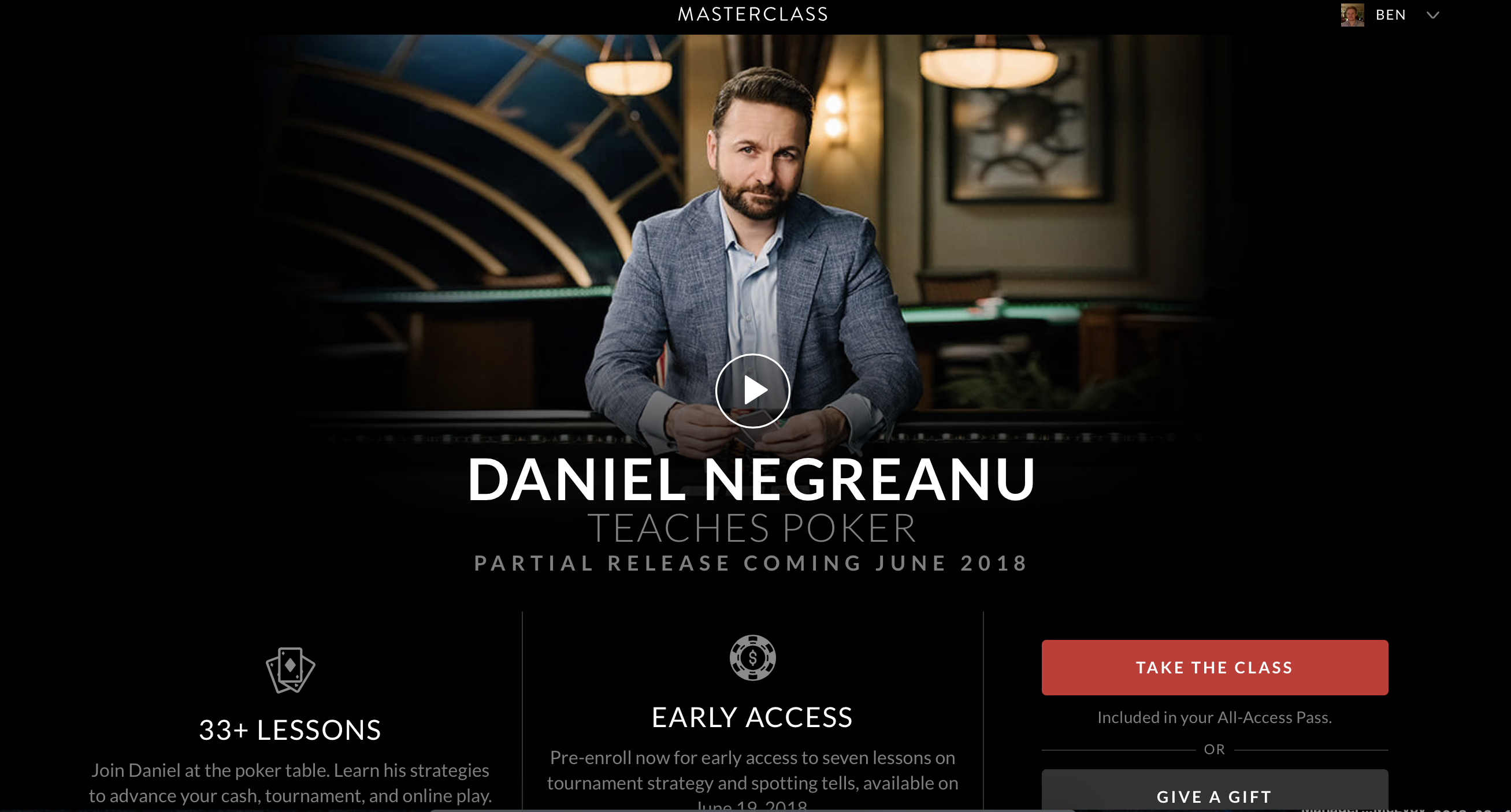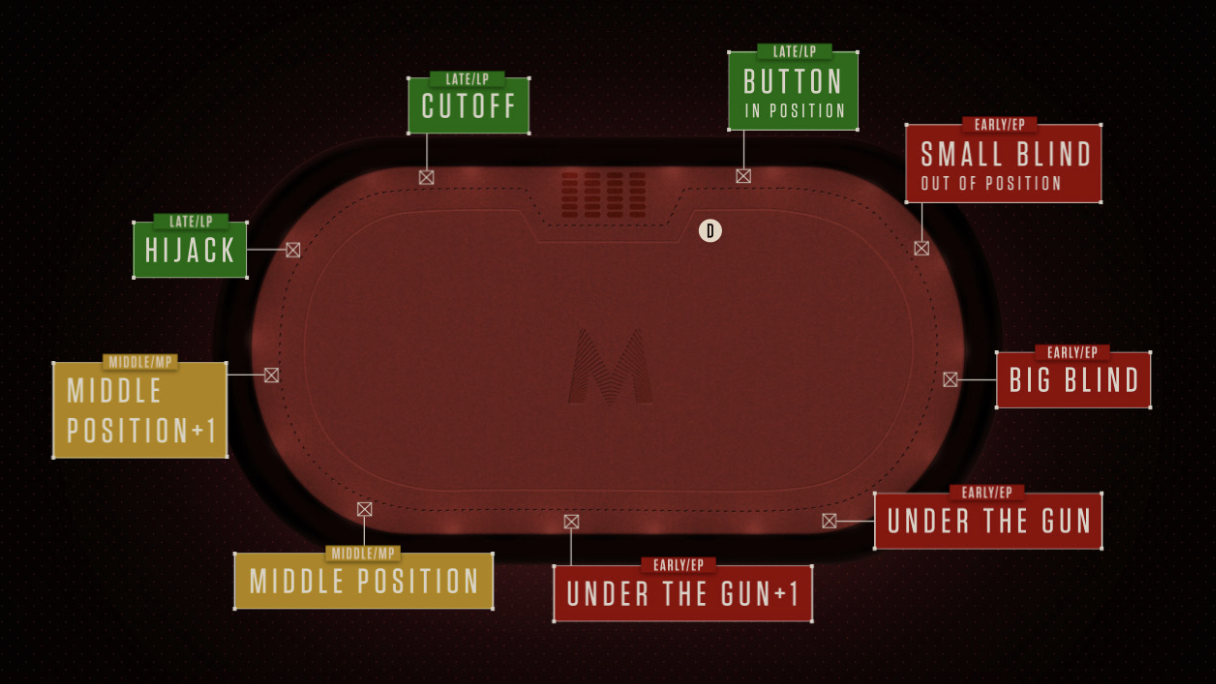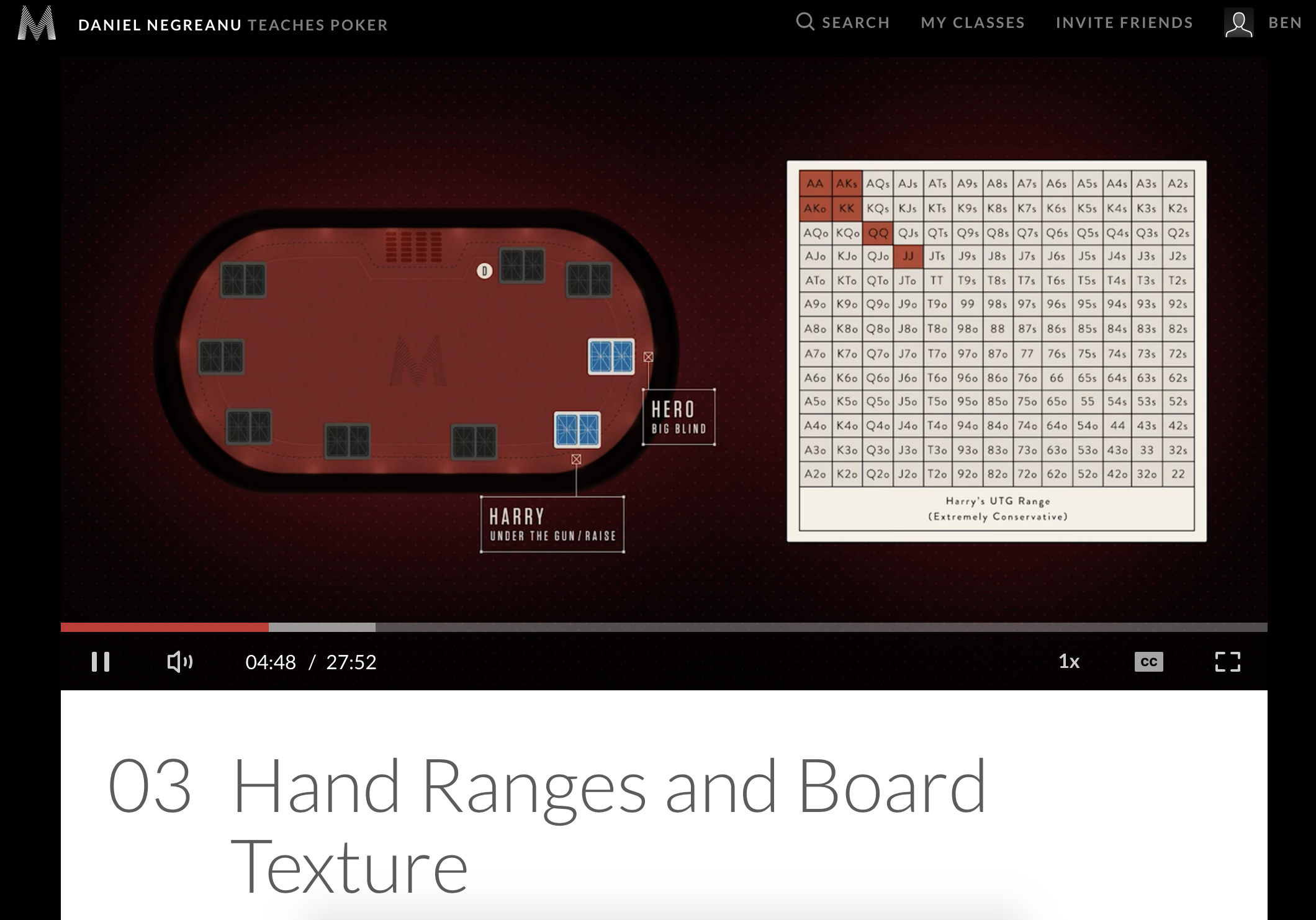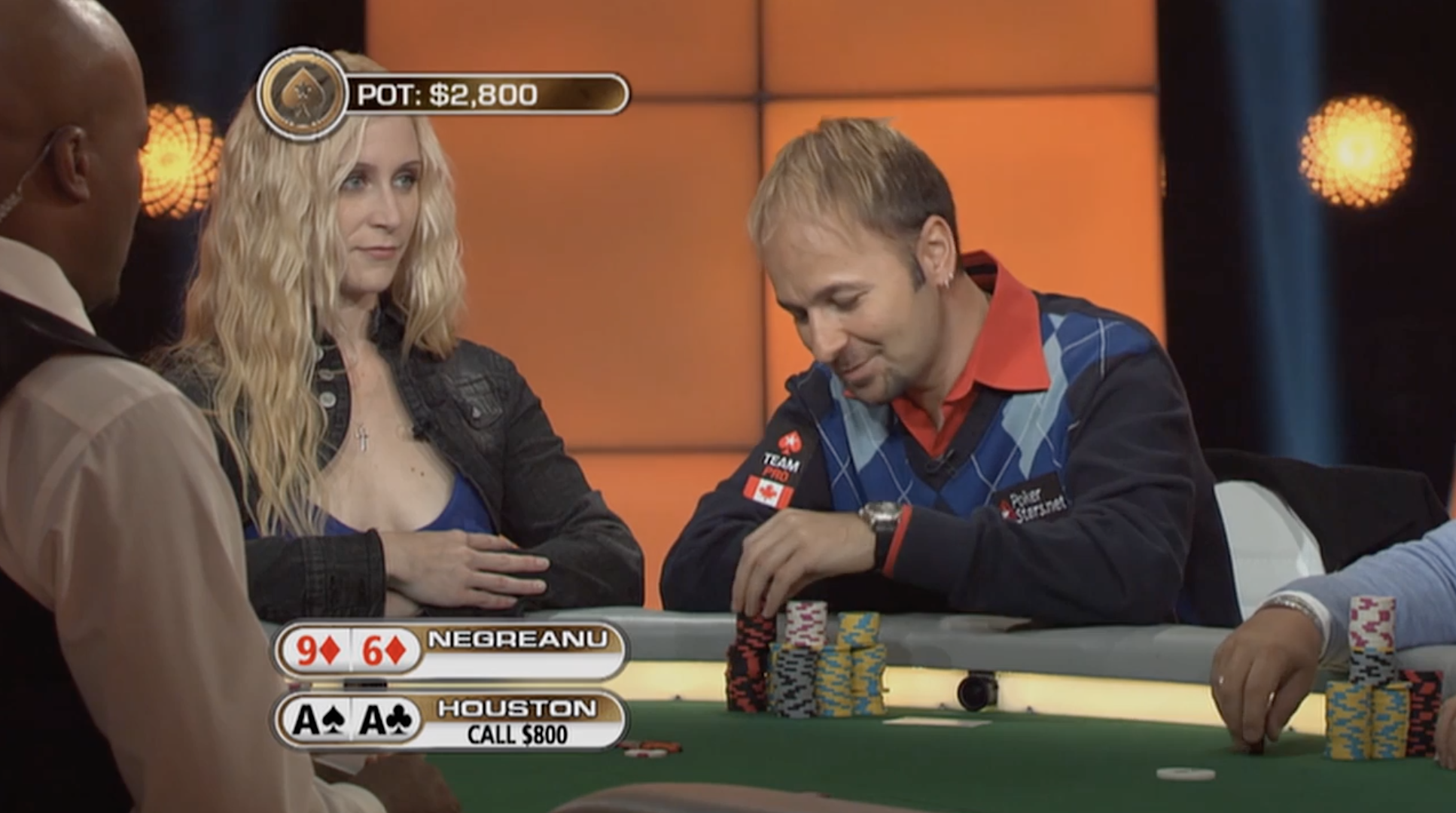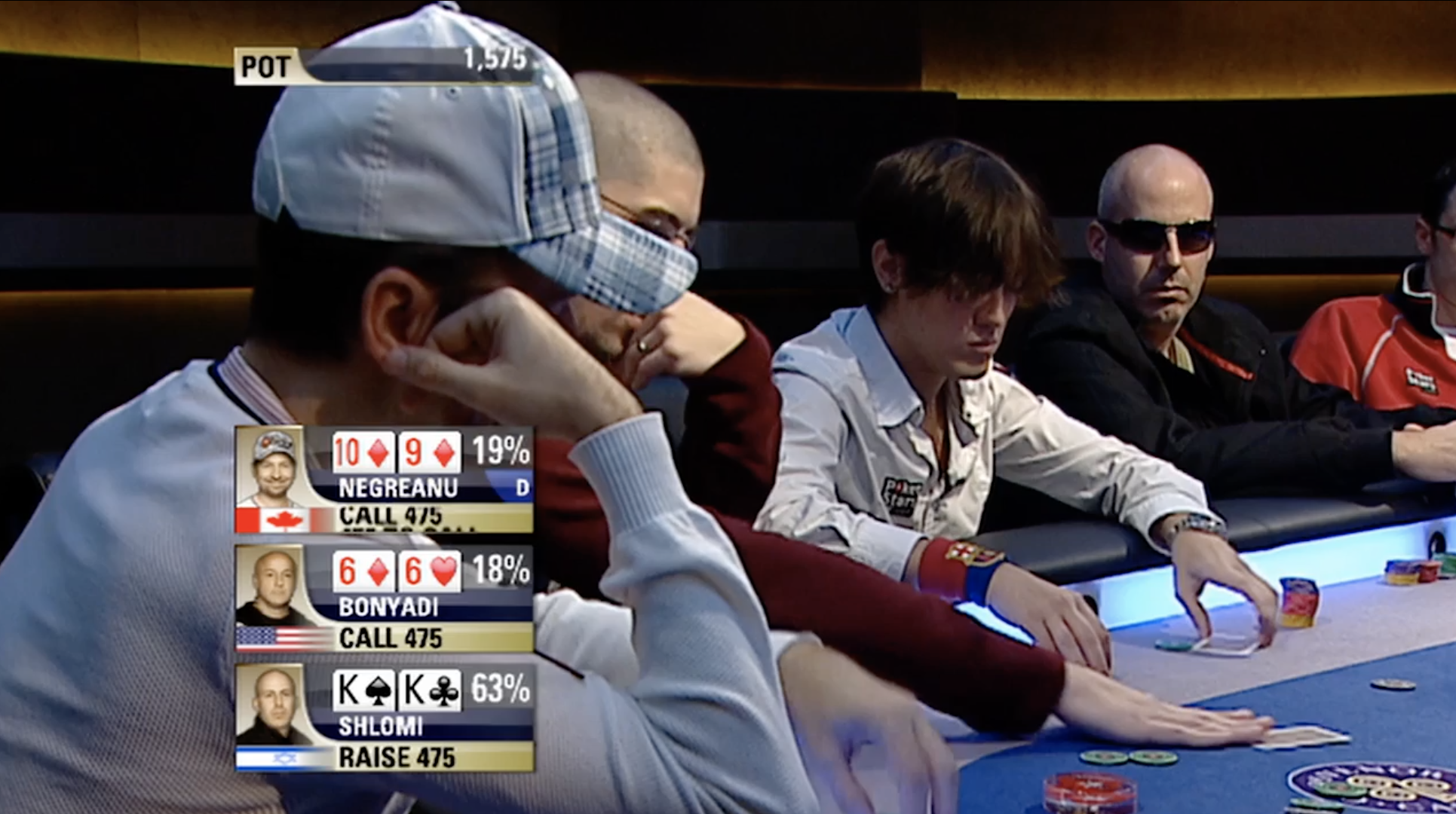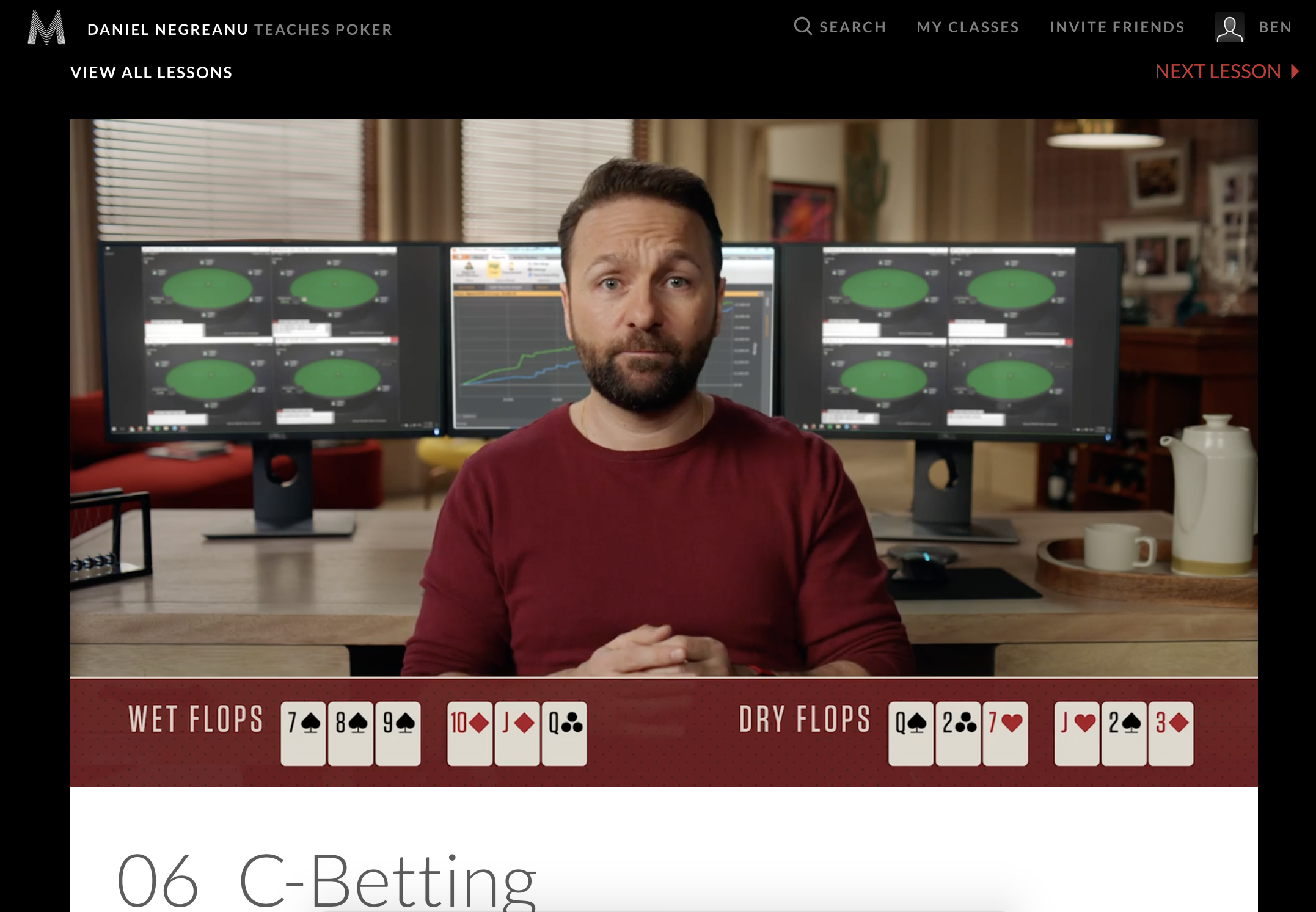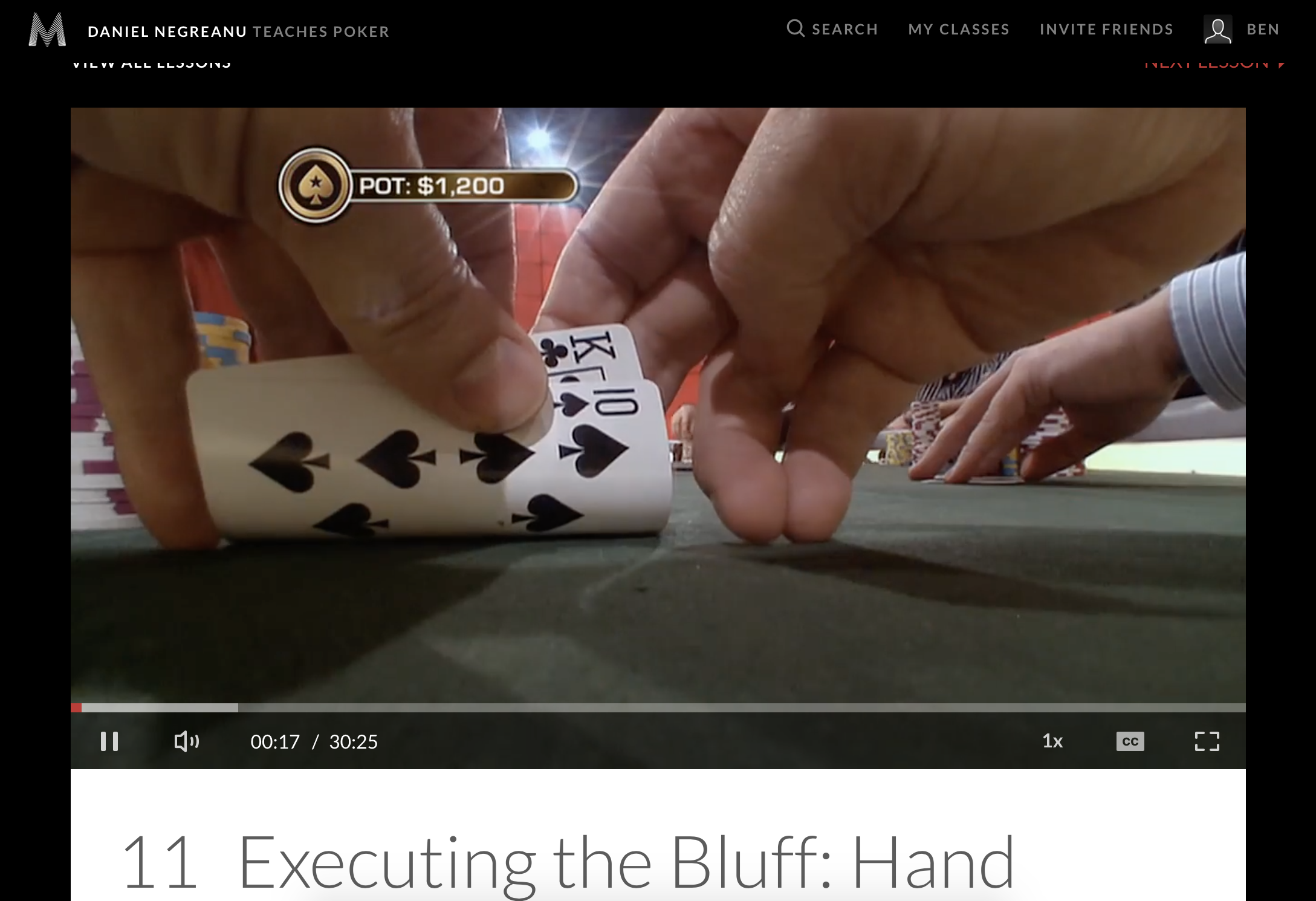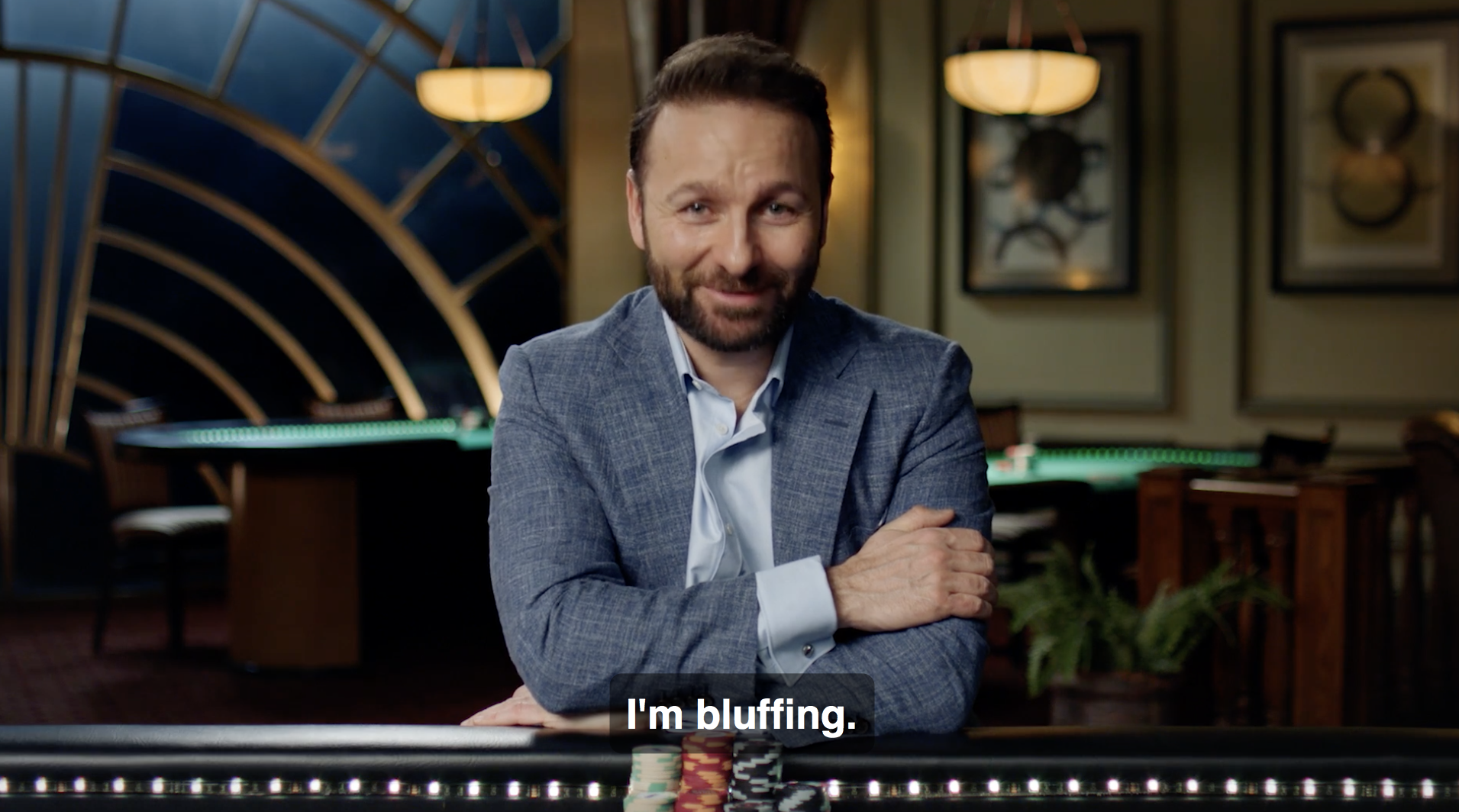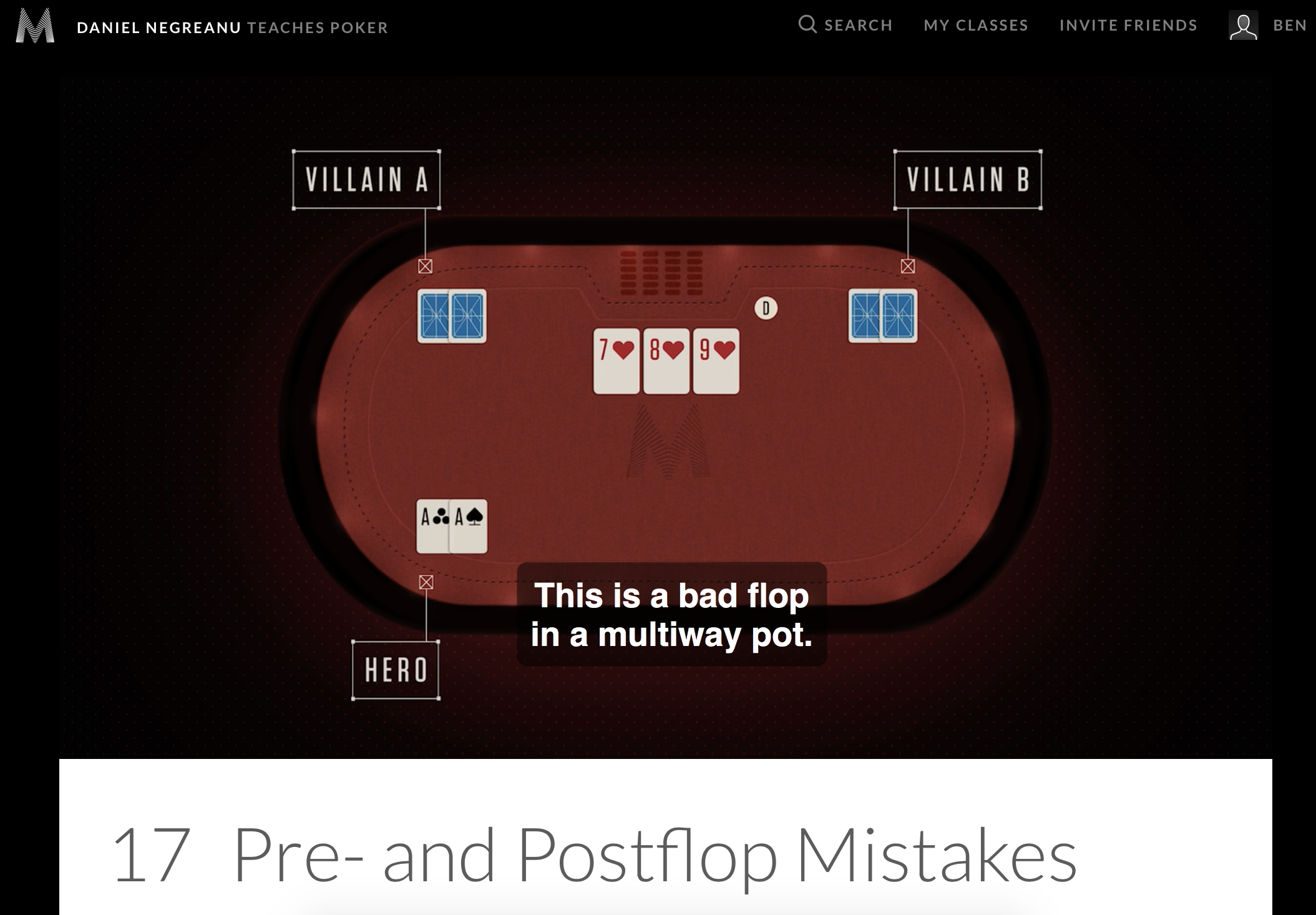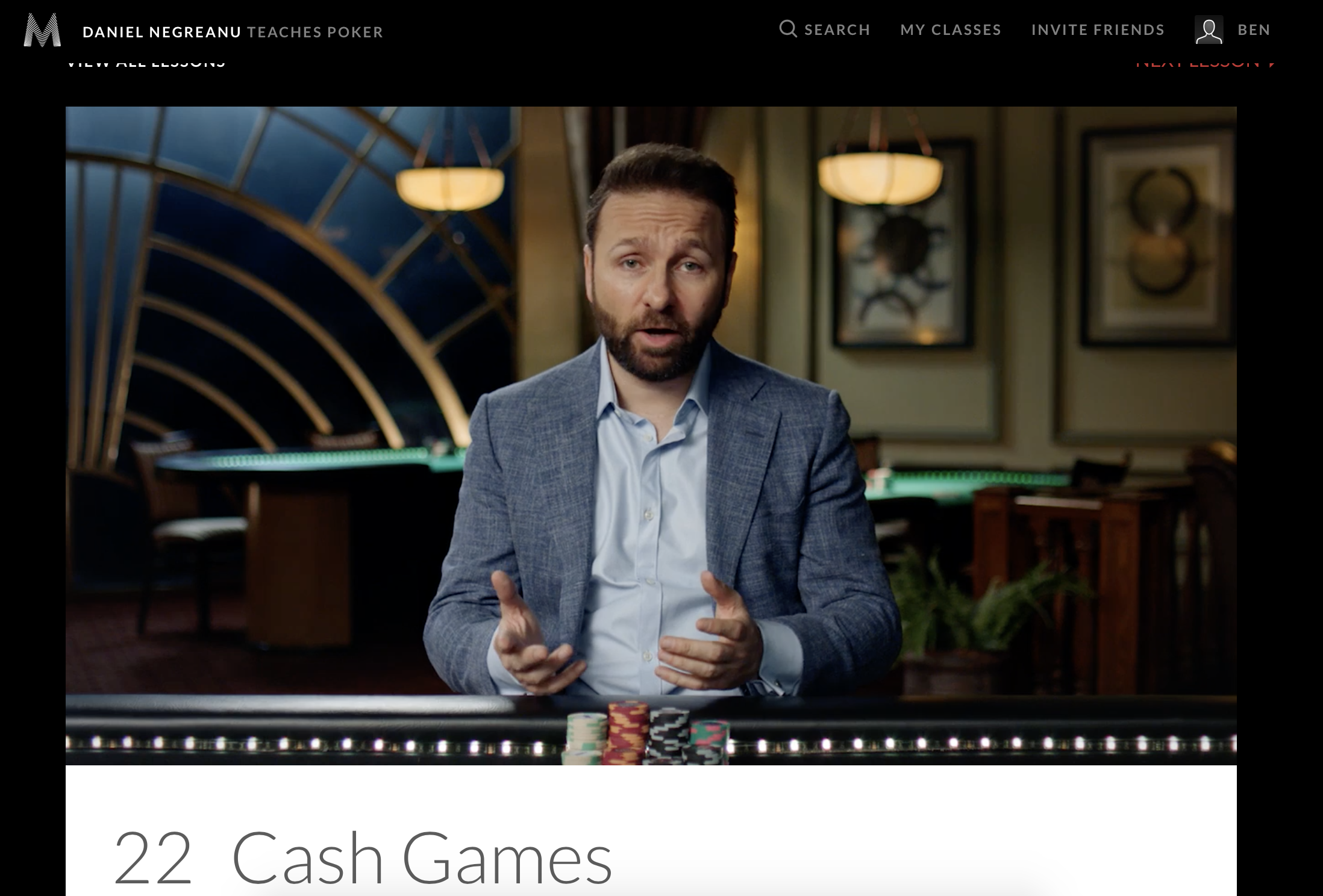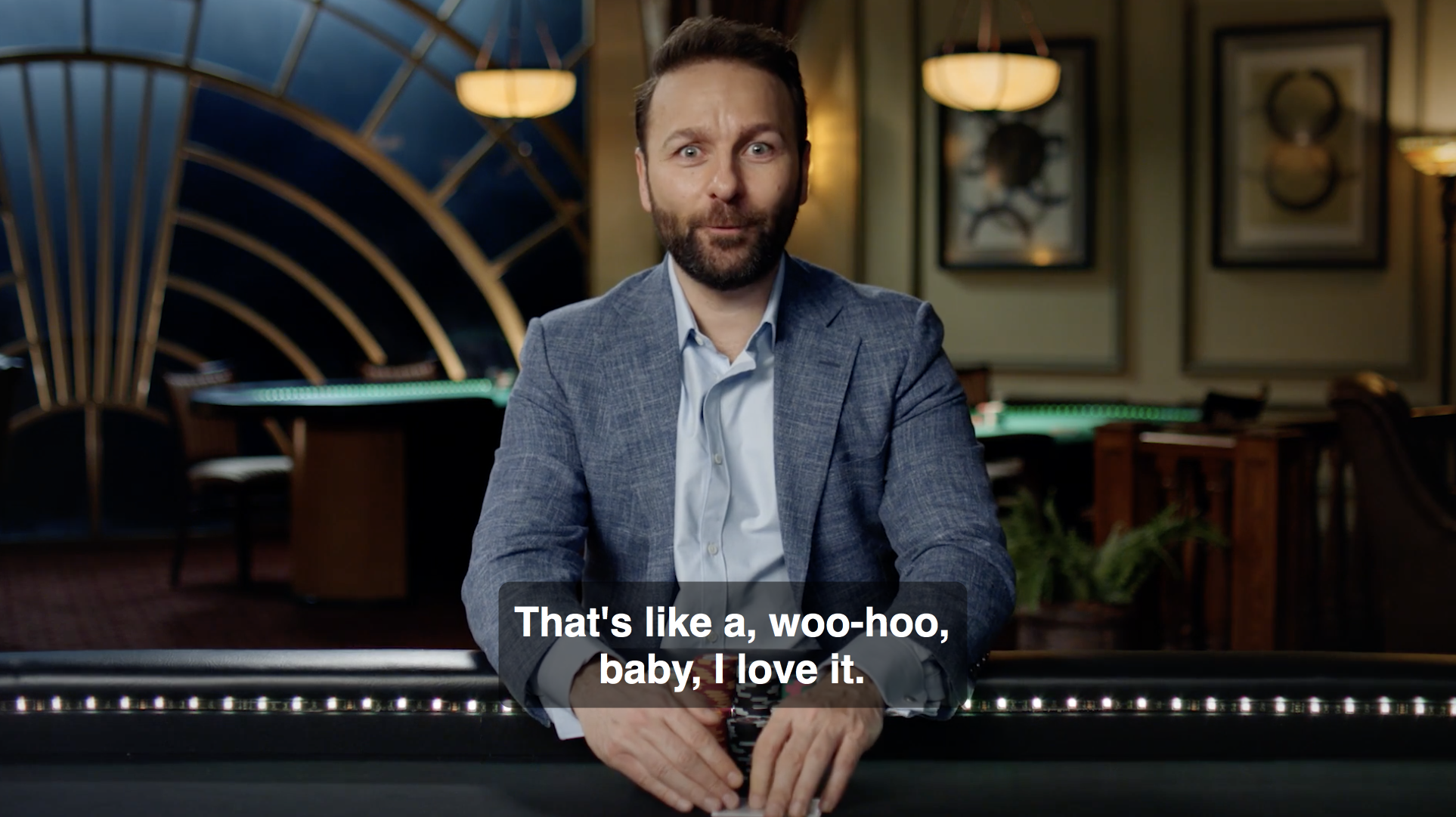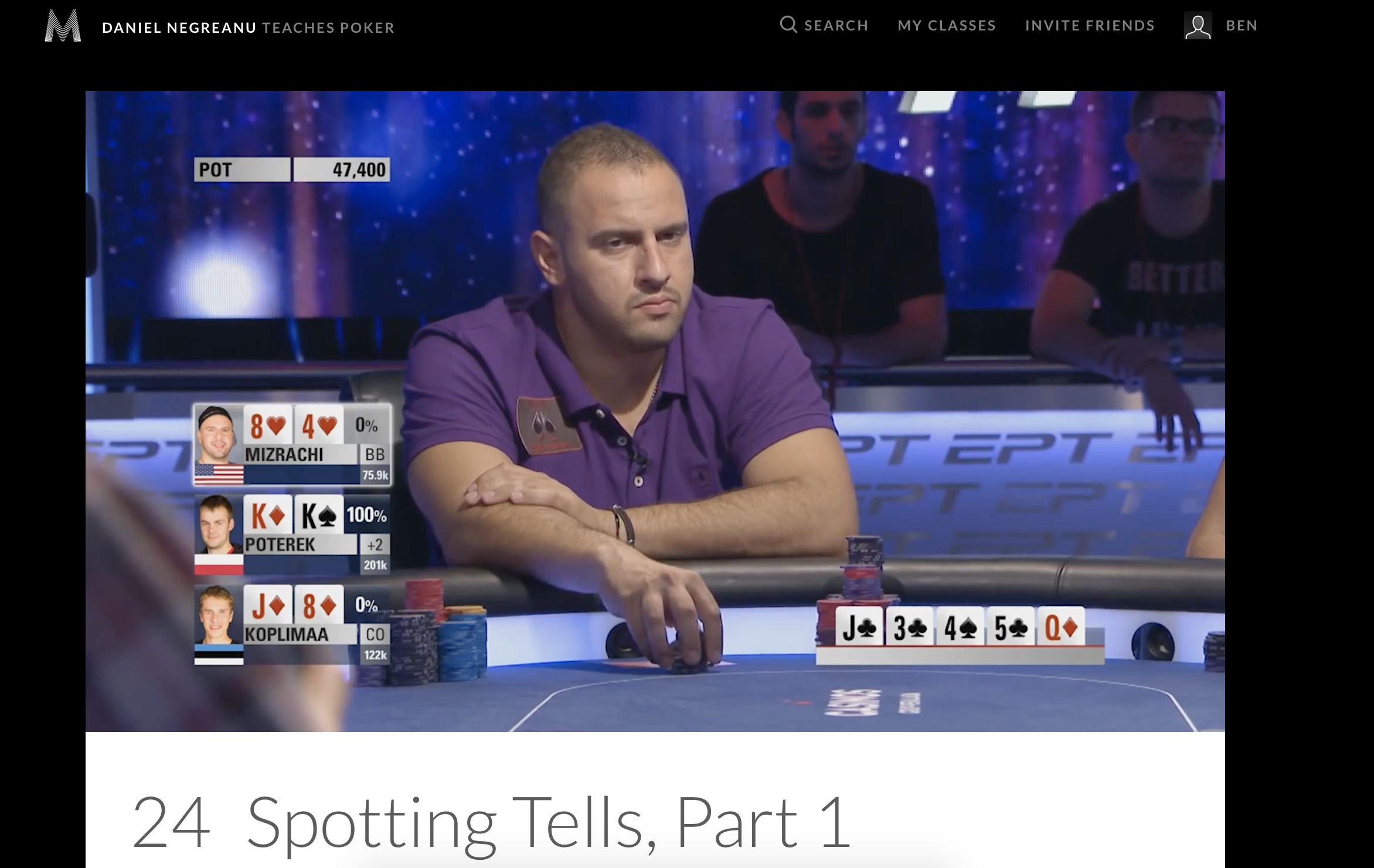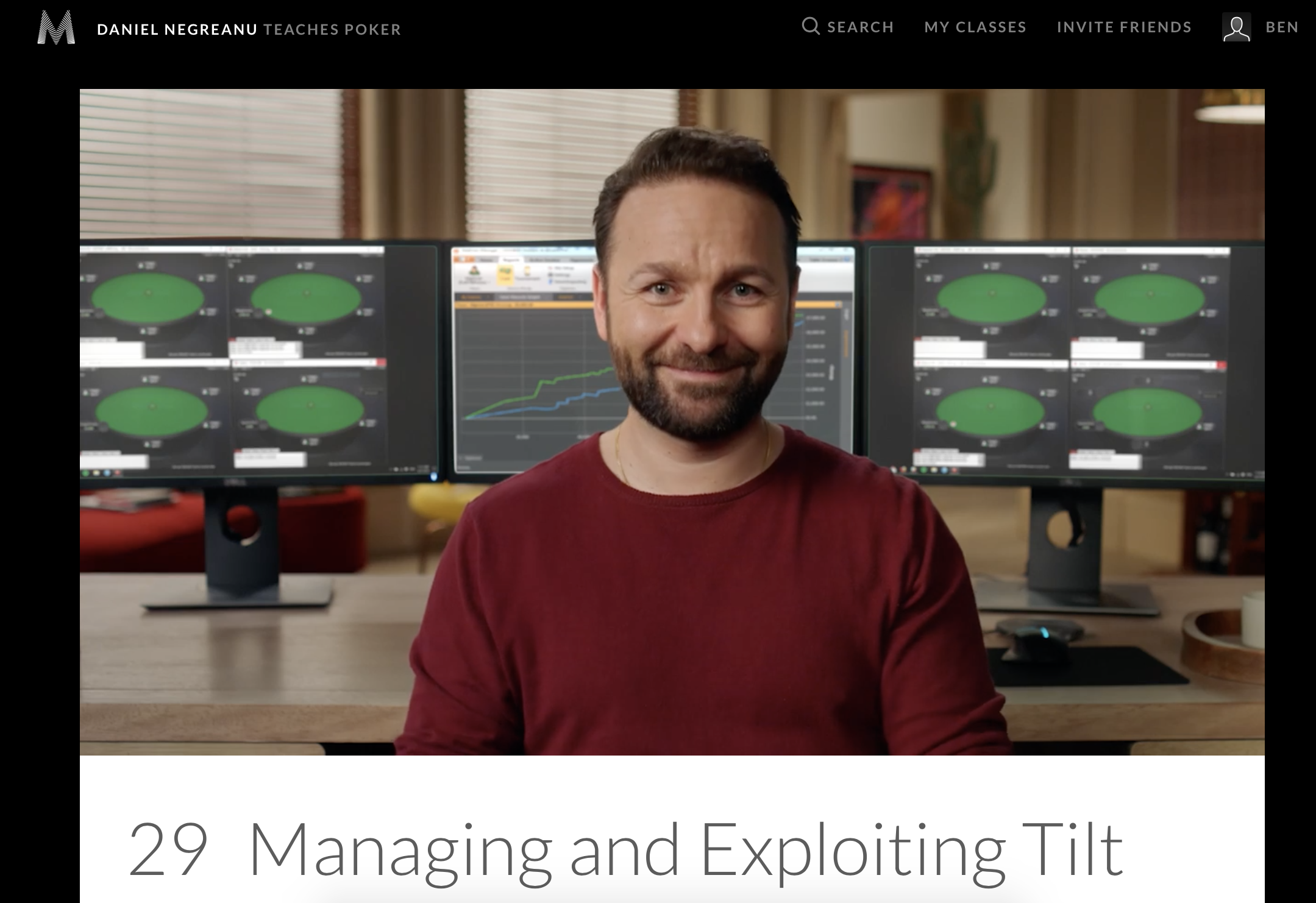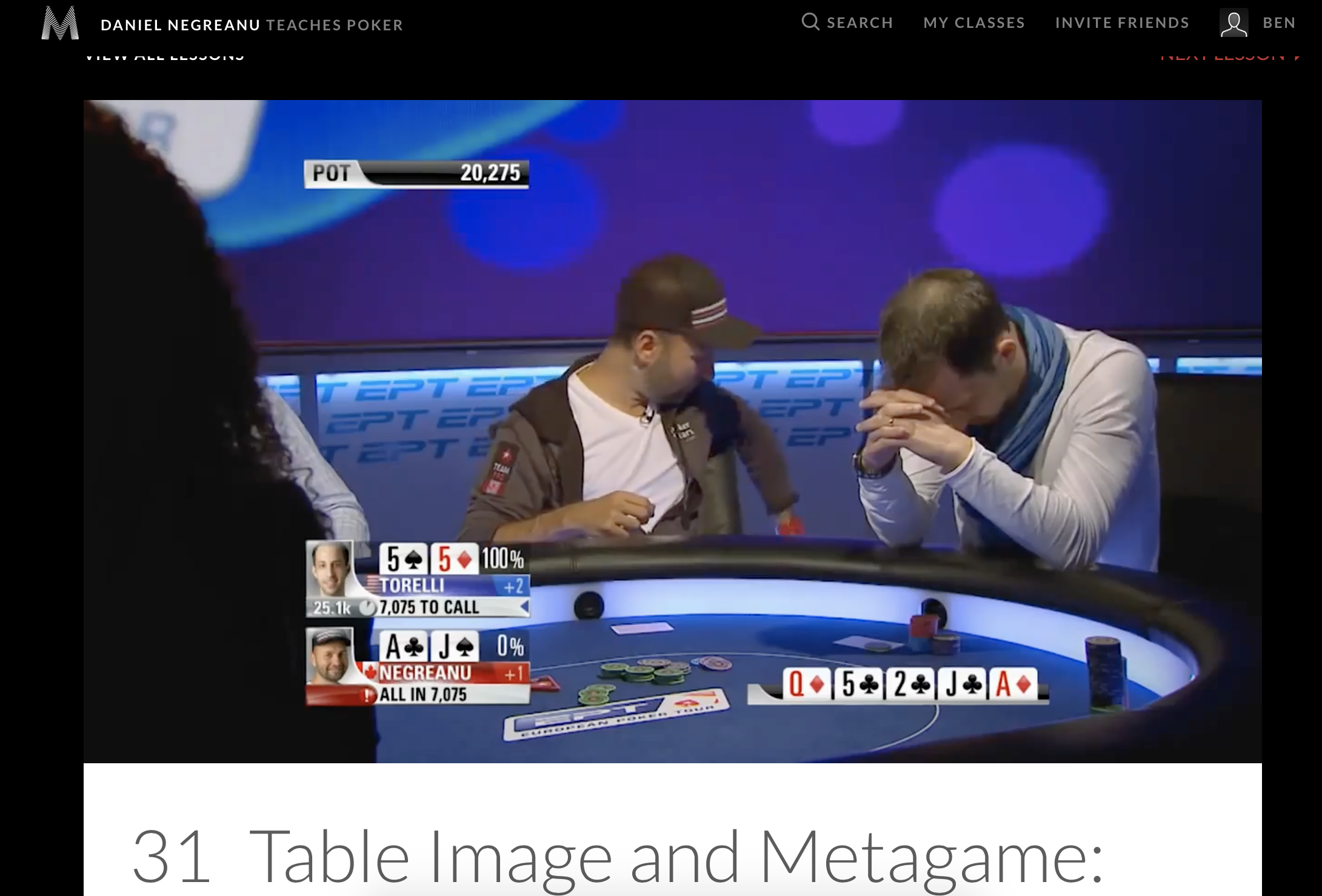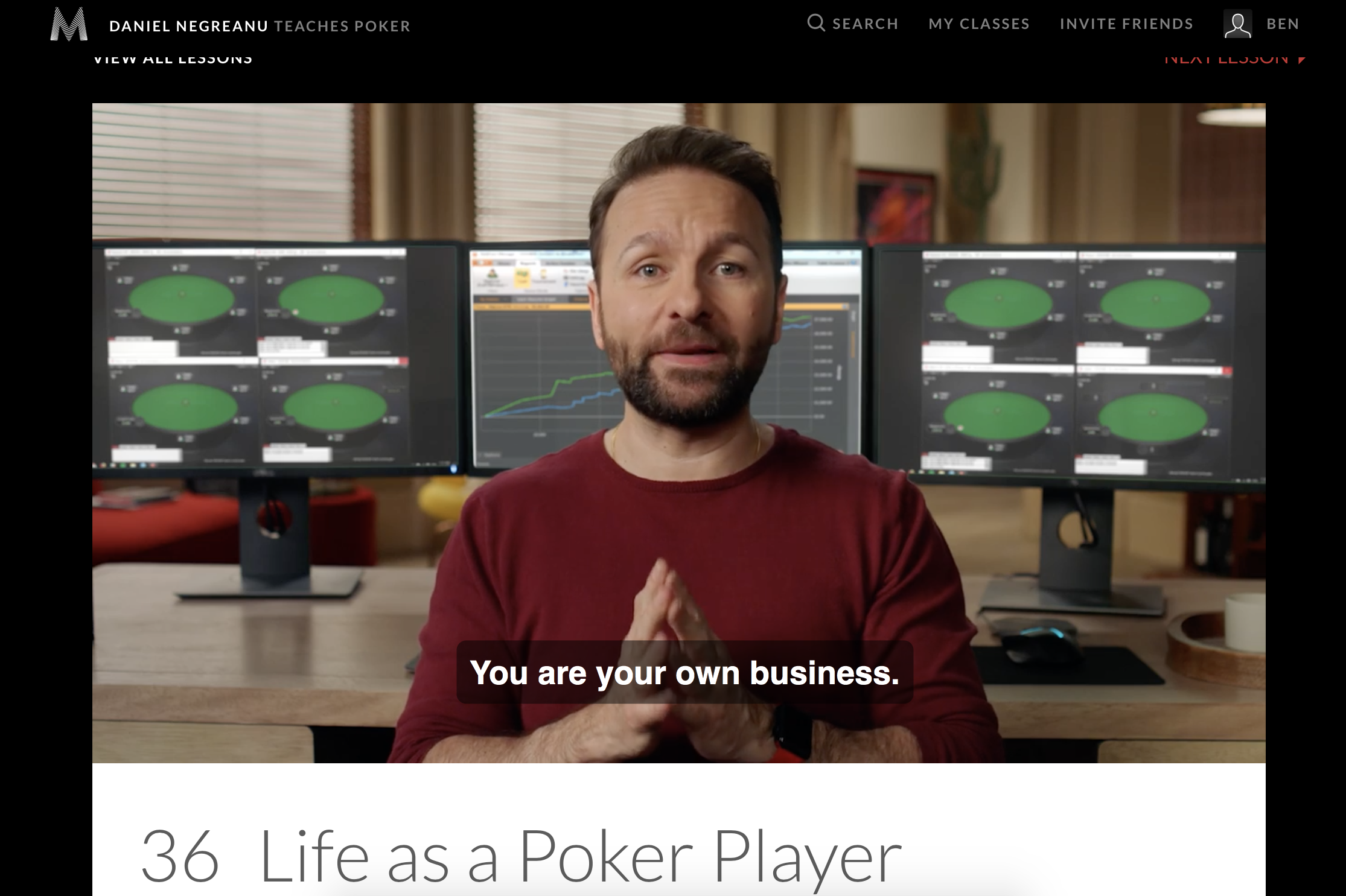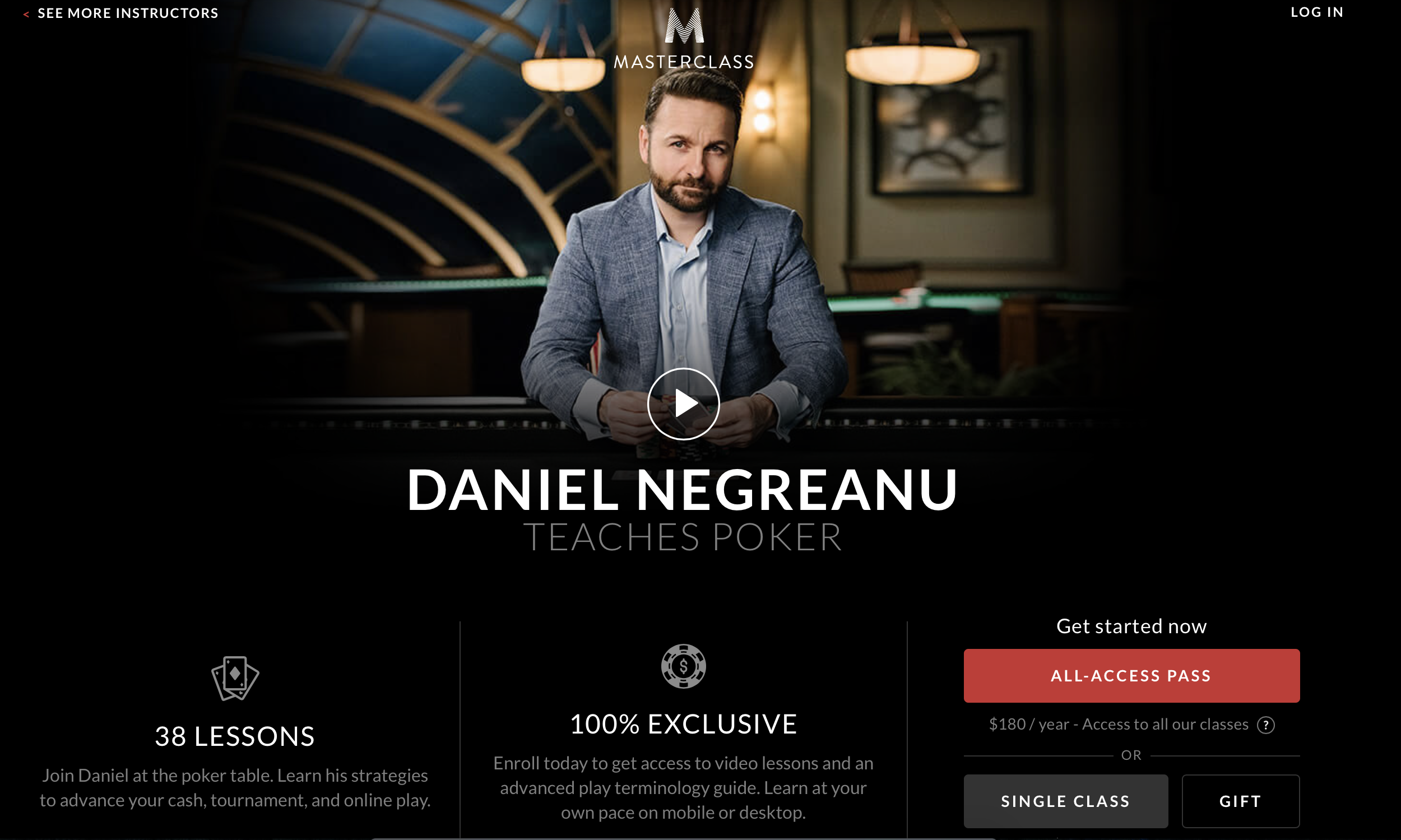I enrolled in the Daniel Negreanu Teaches Poker MasterClass because I wanted to hit some poker games with my brother. Also the masterclass was part of my All Access Pass (I love this thing), so I thought, ‘Why not?’
My attitude going into the masterclass was casual. But it didn’t take long before Daniel Negreanu made me obsessed with poker.
With 38 video modules, and at 8 hours of running time, this is the longest MasterClass in the MasterClass catalogue.
Not only is this MasterClass the longest, it’s also a prime contender for one of the best (if not the best).
Daniel Negreanu Teaches Poker MasterClass Review
You know it’s going to be a great masterclass right from the first video in which Daniel Negreanu outlines all the goodies we’re gonna learn.
Daniel tells us we’re gonna be seated across from him on the felt and he is going to share stuff he’s never shared before.
Stuff like reading people, picking up and hiding tells, tournament strategy, continuation strategy, figuring out when you should bet, multiway pot dynamics, three betting, and real life footage breaking down who did what correctly and the mistakes made.
Daniel’s aim with the masterclass is to take us from poker incompetence to competence in four stages and get us to the point where concepts like pot odds are like breathing to us.
Now with poker there’s a lot I don’t know…
But I didn’t know how little I truly knew (which is next to nothing) until the first module where Daniel goes deep into understanding positions.
Every guy thinks he can play poker, but I’ve never once – nor have any of the guys I’ve played with – ever talked about position as a key element of the game.
Sorry, if you’re an advanced poker player reading this thinking I’m an idiot but everyone has to start somewhere. And although there was a lot of number shit going on in this lesson, and a lot of stuff that made my head spin, I’m confident this class can accommodate a complete beginner in the art of poker.
Though this masterclass by no means feels like it’s tailored to complete beginners – there’s a lot of assumed knowledge that makes me think a more advanced poker player will get the most out of this MasterClass.
After learning how to play hands in the early, middle, and late positions and in blinds, and going through how to set a baseline you can adjust to player tendencies, and also capitalising on winning pots based on position (followed up by a quiz to see if you really know how to use your positioning to win pots)…
My head was spinning and I needed to rewatch, and refer to the booklet, to get a more solid grasp.
Interestingly, looking into the student comment section there are two types of students enrolled in the Daniel Negreanu Teaches Poker Masterclass:
- Complete beginners (who feel out of their league)
- Experts/advanced/intermediate poker players who are loving it
So if you’re a complete beginner, you’re going to want to play some poker (online is easy) and get a feel for the game before diving into the course.
Once you’ve got a feel, you should feel like you can follow better.
It may still stretch you but you’ll at least understand the references and stuff.
Then it was onto the next lesson: hand ranges and board texture.
This is a deep lesson – deep in content and long in length.
It’s a half hour with Daniel breaking down hand range theory and using different scenarios to identify ranges based on betting patterns, player tendencies, and board textures.
I LOVED this lesson.
Daniel really taught this well – very simple language and he knows exactly how to talk in a way that beginner-types understand but also he can move on swiftly so that more intermediates can get into the meat of this subject.
We learn the philosophy of how to know if your opponent is bluffing or not and learn how to build a mental database of your opponent’s hands.
We also learn how to avoid becoming exploitable. This was so fascinating. Again, I’m coming at this as a beginner but Daniel’s passion, energy, excitement, and the ease with which he makes complex subjects comprehendible really enthuses me.
You then have an advanced lesson in how to play against a player’s perceived hand.
Daniel made it so easy for me to understand range advantage.
I started playing some amateur games online and, even though I don’t have much of a past poker version of me to compare with (other than someone playing very randomly), I immediately noticed that this awareness alone made me the best player at the table. Granted these were amateurs (like me) but we’ve gotta start somewhere.
There’s a real nice ebb and flow to these lessons where Daniel sets up the topic, explains it terms everyone can understand, gives examples and techniques that, again, everyone can understand, and then he pushes it into advanced territory.
During the advanced bits, I don’t understand everything (or much at all) but I find myself riveted because Daniel is such an engaging speaker. It’s absolutely fascinating.
And once the advanced bit is over, it’s back again to another nuance of the topic and we go through the cycle again – so I’m thinking this masterclass is great for all levels of poker player.
I actually can’t go into just how rich and deep these lesson are. I’m in awe – as is pretty much always the case with MasterClass. These A-list teachers really know how to give utmost value.
I particularly found the discussion on adjusting your ranges based on opponents not stakes to be fascinating.
You should feel comfortable making the same play you would in a $0.50 a dollar game as you do in a $1,000, $2,000 dollar game.
I really love the abundance of case studies where we watch it through once and the go through it again with Daniel’s analysis and insight.
This is one of the staple teaching tools of this masterclass – footage of hands that we watch together with a specific technique/topic in mind to study and Daniel’s analysis alongside.
In the first one of these we get to see footage from The Big Game where Daniel takes us through his thought process as he figures out his opponent’s hand in real time.
What I’ve noticed – and this is awesome – is that the student community seems MOST ENGAGED in this poker masterclass.
If you look at the discussions going on below each video module, it’s wonderful.
There’s A LOT of students – serious students – who write a lot about their experience and talking through their learnings and there’s tons of engagement back and forth.
It’s a very very nice atmosphere. Who knew poker players were this engaged, cerebral, and cordial? Fantastic to see.
The lesson on c-betting or continuation betting was a real learning experience for me.
I’m such a newbie that I didn’t even really know about continuation betting before this lesson, but after watching it through twice and consulting the workbook, I noticed my sloppy amateur playing skills improved in my online games and I was actually losing less chips – thank you, Daniel!
This is the kind of MasterClass that you will return to again and again.
I like to have my online poker open in one tab and a class from this masterclass in another and then I purely focus on ONE aspect of poker that I want to learn and practice.
Obviously each topic gets progressively more advanced, so at this stage I’m just trying out the beginner stuff and having a blast (and seeing success). But I know once I’ve got a lot more games under my belt, I’ll be back to put the advanced stuff into practice.
I can’t emphasise enough just how much fun this is.
It’s such a nice end of the day. I’ve been kicking back in the evenings with a beer or some wine and just playing a little poker and learning from Daniel and, man, after a hard day of work, the time really melts away like this. Pretty blissful.
Then we get into the deadly weapon of check raising and how adding this to your poker arsenal can really increase your bluffing opportunities and a wonderful discussion on how to become someone who is feared in all situations.
At this point in the class, I barely scratched the surface of what Daniel’s teaching, but I thought it best to reign myself in and keep to only a few different topics that I could put into action – and also the modules that just looked cool or interesting.
So, for now, I skipped past the three-betting modules, multi-way dynamics, all the tournament strategy stuff (there’s a lot but I’m a long way off from entering any tournaments – though I’ll join a few online ones this month just for fun).
After getting a bit of strategy stuff under my belt, of course, I went for the bluffing modules.
I simply couldn’t resist.
Very interesting stuff about how making your bluff credible on the river relies on your ability to look backwards at everything that has happened before – so all the facts line up.
Trying to pretend you’ve got pocket Aces but it was raised, two people called, and you just called with pocket Aces? If you’d really had Aces you’d have been way more likely to re-raise before the flop. Stuff like that.
Again, like all the modules, the section on detecting and executing the bluff starts off simple and then quickly gets into advanced territory.
Then after a long theoretical lesson on bluffing, the next lesson is over 30 minutes of analysing three different pieces of footage of hand reviews.
I simply can’t believe the value on offer with this MasterClass.
The depth here really is extraordinary.
This truly is a masterclass.
The thing a lot of people ask with video courses is:
Wouldn’t it be better/cheaper just to read a book on the subject?
Cheaper, sure.
But certainly in this case (as is the case for almost every MasterClass I’ve taken), the video course is far superior to a book.
Firstly it has all the detail a book would give and more, but it’s way easier to learn lessons, way more engaging, way easier to remember stuff, and generally the value far exceeds that of a book.
After deep analysis, it’s back into a new topic and it feels like your mind is able to switch gears and refresh a little – bet sizing, which is still relating to previous lessons about bluffing – everything is integrated very well in this course.
You can hop about choosing the modules that interest you the most (like me) or you really can follow it through in a logical progression.
This masterclass is structured extremely well.
What I love also about these lessons is just how robust the knowledge is.
Not only does Daniel break down what each topic is and make you understand it, not only does he progress quickly through beginner, intermediate, and advanced strategy to satisfy everyone, but he’s also always consistently threading stories about the history of poker to emphasise his points.
I particularly loved hearing about the history of overbetting and how it originated in poker (it wasn’t always a thing).
Mixed strategy was another fascinating module, and it’s this kind of psychological discussion mixed with real life examples, logic, game theory, and maths that will make you a stronger more unpredictable player.
I also greatly enjoyed the module on pre- and post-flop mistakes.
This was incredibly useful and something every player should know – especially beginners.
This lesson immediately improved my poker game.
I realised I was making so many stupid mistakes. Also making mistakes that are stupid but not obviously so.
So many videos in this masterclass are worth the price of entry alone – this video is definitely one of them.
Cash game strategy was fascinating.
I skipped over the tournament stuff for the time being in favour of this because this is where I’m starting.
So interesting to hear how Daniel’s strategies can have you earning consistent money from month to month in cash games.
Even though I skipped over the tournament stuff, hearing how Daniel compares tournaments to cash games made me want to go back to the tournament stuff just out curiosity anyway.
So after this review, I’m gonna kick back with a beer and watch some poker tournament lessons.
Then we get into masking tells…
Body language, how to stop giving stuff away, and how to spot physical tells in other players.
Man, this was an exhilarating portion of the class – in a class where every video was A+ material, this was truly something.
Daniel actually demonstrates different body languages and tests us, asking if we can tell if he has a strong hand or weak hand based on his reactions.
Fascinating how much stuff needs to go into developing a baseline so you don’t give away your hands.
We get really deep into tells with four modules devoted to it. It’s amazing how many details Daniel looks for in his opponents – everything he breaks down, his methodology, just reinforces his success a thousandfold.
Daniel is a bloody detective! He’s Sherlock Holmes.
He breaks down freaking everything from the meaning behind players mean-mugging, to different chip shuffling paces, to eye movement patterns (which Daniel says an understanding of has made him the most money), to movement timing, table talk habits (in fact there’s a whole separate module devoted to this), betting motions, breathing, oral fixations, reverse tells, and even to smoking habits. And of course there are quizzes that Daniel gives you to test if you’ve integrated this knowledge.
After discovering the eye movement tells, the ones that made Daniel the most money, I got a real hunger to get myself into some lower limit games to test it out (after a tad more education of course).
I really love how this turned into a body language masterclass.
The table talk section was so riveting – more detective work, learning about all the nuance that goes into asking even the simplest questions of your opponents.
Then we learn about how to think at the poker table.
This module blew me away. This one, like so many in this class, was worth the price of entry alone.
This module was followed immediately by another one that was also worth the price of the course alone, called ‘Managing and Exploiting Tilt’ – this is where we’re really getting into the philosophy and principles of being a professional poker player, someone who gets their paycheck from poker.
Fascinating stuff. And applicable to everything in life – not just poker. You get some really masterful mindset tips in this module.
The module on table image and metagame was also super interesting because it’s about constructing a persona that will work to your advantage – how to manipulate the way people see you so you can exploit your image.
Daniel talks about if you’re a tight player who never bluffs, how do you exploit that?
Or if you’re a crazy player, how do you exploit that?
Daniel calls this the meta-game at the highest level, so of course this module, while fascinating to a beginner like myself, is going to have real practical relevance to more the seasoned poker veterans taking this masterclass.
I particularly loved seeing footage and breakdown analysis of table image – how to get into another player’s head and find out what he thinks you’re capable of and what he is sure you’d never do.
I was on the edge of my seat watching this analysis and it was riveting hearing Daniel explain how he got into his opponent’s head with his bluff.
Player profiling was also fascinating – again, Daniel goes deep into the psychological aspect of poker.
That’s what I really loved about this course – you’ve got everything – the math, the game theory, the psychology, everything.
The bankroll management was also very illuminating – most of it was very poker specific, but some of this advice could be extrapolated for a lot of professions that aren’t traditional 9-5s too.
Off-felt training was also fascinating because it was filled with advice so relevant to anyone trying to become a master in any field. Lifestyle advice for anyone who wants to be a super achiever in difficult fields. Obviously it was poker-heavy in its advice but I loved the fact that you could extrapolate so much advice for life generally too.
I also really loved Daniel’s pre-game rituals (everything from food, sleep, meditation, and visualisation).
Then, bonus materials (how to play online poker) and office hours aside, this masterclass was rounded off with a discussion about life as a poker player.
This was advice for the poker experts.
As usual, it was fascinating. Obviously I just wanna play a few games here and there but this class was still very interesting to me – and would be way more relevant for those of you who have aspirations of winning millions of dollars playing poker professionally.
There was a lot I didn’t/couldn’t cover in this review.
Namely because I’m not even close to finishing this masterclass (there’s so much in here).
Also because it would just be impossible.
At an 8-hour running time there is no filler whatsoever.
Everything Daniel says is golden.
If you’re interested in bettering your poker game, you really just need to enrol in the class and see for yourself.
I began this masterclass thinking I just wanted to learn a few tips so I could better enjoy poker games with my brother and maybe occasionally enter a game online or with friends and not be embarrassingly bad.
But about halfway through this masterclass, my mindset and aim changed completely.
I was like holy shit I actually really want to study this craft, get good at it, and start winning some money from this fascinating game.
And now the journey is just beginning.
I hope you and I can have a game if our journeys cross paths.
You know where to find me if you ever fancy a bit of poker.
